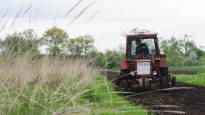Water also has military significance. In the early stages of the war, Ukraine opened dams and released water into the fields to make it harder for the Russians to advance.
The large Dnieper and Dniester rivers and numerous smaller streams bring water to Ukraine for the needs of the population, agriculture and industry. A dispute over water resources arose as early as 2014, when Russia took over the Crimean peninsula.
Ukraine then cut off water supplies to Crimea and built a dam in Kherson to prevent water from flowing into an important canal in northern Crimea. When the Russian invasion began in February, Russian troops blew up the Kherson Dam in the first days of the war.
The power of water has also been used to defend the capital, for example on an artificial lake near Kiev.
– Flood hatches have been opened downstream, bridges have been blown up and the progress of the Russians has been slowed down, explains the Ministry of Agriculture and Forestry’s leading water management expert on international water issues Annukka Lipponen.
The conquest of Crimea weakened hundreds
The main route of the North Crimean canal is 400 kilometers long. Director of the Council Joseph Stalin a huge infrastructure project built during the reign accounts for up to 85 percent of the region’s water resources. The ingredients of the wider controversy were sown even before the February attack.
Crimea’s water supply has deteriorated in recent years, despite Russia’s efforts to drill wells, build water reservoirs and invest in water treatment. In 2021, the drought destroyed the crop and yielded Russia blames Ukraine (moves to another service) The environmental damage and suffering of civilians caused by the dam built near Kherson.
Former Deputy Prime Minister of Ukraine, current Minister of Defense Oleksi Reznikov said Russia, as an occupier, has a duty to safeguard the basic needs of the local population.
Attacks on water supply prohibited
Water disputes between Ukraine and Russia extend beyond Crimea.
Water distribution and the sewage network have also been damaged in the regions of Donetsk and Luhansk and southern Ukraine. The destruction of the water supply has far-reaching implications. It is not just about the drinking water needed by the residents but also the different factories need hydropower.
According to water expert Annukka Lipponen, the so-called Geneva Principles on the Protection of Water Infrastructure in Armed Conflict have been drawn up, which prohibits attacks on such sites. However, these rules of war are also forgotten in Ukraine, as in many other hotbeds of conflict.
Ukraine’s water supply in some places in poor condition even before the war
Even before the war, a third of household wastewater in Ukraine has gone untreated.
– Reconstruction is laborious and investment is needed. There is also repair debt in Finland when the pipelines become obsolete. The same certainly applies to Ukraine, now it has not been possible to repair the pipelines. Damage to dam structures affects timely storage and security of supply, says Annukka Lipponen.
He monitors transboundary water cooperation in the Ministry of Agriculture and Forestry and promotes international water issues.
Water supply reconstruction of the first sites
At present, Ukraine and Russia are not in peace talks, let alone any other formal talks.
– Transboundary waters are managed, for example, through transboundary river commissions or annual meetings. Now there have hardly been any meetings between Ukraine and Russia. On the other hand, co-operation on water issues has continued in several crisis areas despite conflicts, says Lipponen, a water management expert.
The war continues across Ukraine. However, reconstruction is already beginning in some places. Among other things, Chernihiv is working to rehabilitate public infrastructure from water utilities to the electricity grid.
The development manager has also been interviewed Seppo Hellsten About the Finnish Environment Institute’s water center.
You can discuss the topic on 19.5. until 11 p.m.
